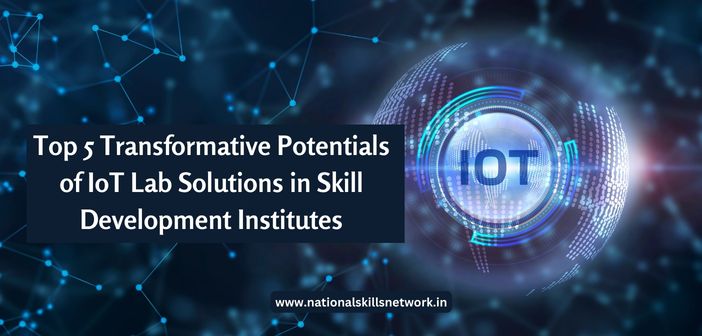Top 5 Transformative Potentials of IoT Lab Solutions in Skill Development Institutes
Creating Immersive Learning Environments
IoT labs serve as incubators of innovation, offering students the opportunity to experiment, tinker, and prototype IoT solutions in a hands-on setting. Equipped with state-of-the-art hardware, software, and sensor modules, these labs simulate real-world scenarios across various industries, from smart agriculture and healthcare to manufacturing and smart cities. By engaging in practical projects and experiments, students gain firsthand experience in designing, deploying, and managing IoT systems, thereby enhancing their problem-solving, critical thinking, and technical skills.
Facilitating Interdisciplinary Collaboration
IoT projects often require collaboration between individuals with diverse backgrounds and expertise, including engineers, programmers, data scientists, and domain specialists. IoT labs provide a collaborative space where students from different disciplines can come together to work on multidisciplinary projects, fostering teamwork, communication, and mutual learning. Whether developing a smart home automation system or designing a precision agriculture solution, interdisciplinary collaboration in IoT labs cultivates a culture of innovation and creativity, preparing students for the collaborative nature of the modern workplace.
Empowering Project-Based Learning
Project-based learning lies at the heart of IoT labs, where students undertake hands-on projects that address real-world challenges and opportunities. Whether it’s monitoring environmental conditions, optimizing energy consumption, or enhancing healthcare delivery, IoT projects offer tangible outcomes that demonstrate students’ skills and knowledge. By engaging in project-based learning, students develop problem-solving skills, project management abilities, and a deep understanding of IoT concepts and applications, making them highly sought-after candidates in the job market.

Promoting Industry Engagement and Partnerships
IoT labs serve as bridges between academia and industry, facilitating collaboration, knowledge exchange, and technology transfer. Industry partners can provide insights into market trends, industry best practices, and real-world applications of IoT technologies, enriching students’ learning experiences and enhancing the relevance of their education. Through industry-sponsored projects, internships, and guest lectures, students gain exposure to industry practices, challenges, and opportunities, thereby bridging the gap between theory and practice and enhancing their employability.
Enabling Continuous Learning and Innovation
In the fast-paced world of IoT, continuous learning and innovation are essential for staying abreast of the latest developments and trends. IoT labs provide a dynamic environment where students can experiment with emerging technologies, explore new ideas, and push the boundaries of innovation. Whether it’s experimenting with edge computing, exploring blockchain for IoT applications, or integrating AI algorithms into sensor networks, IoT labs encourage lifelong learning and foster a culture of innovation among students and faculty alike.
Also read: 5 Ways Emerging Technology Courses Can Revolutionize ITI Education
Scientech IoT Lab Solutions
As skill development institutes strive to prepare students for the challenges and opportunities of the digital age, Scientech IoT labs emerge as catalysts for innovation and excellence. By providing immersive learning environments, fostering interdisciplinary collaboration, empowering project-based learning, promoting industry engagement, and enabling continuous learning and innovation, Scientech IoT labs equip students with the skills, knowledge, and mindset needed to thrive in today’s interconnected world.
The integration of IoT labs into skill development institutes is a transformative step towards equipping students with the necessary skills to excel in a digitally driven economy. These labs not only provide hands-on, practical experience but also foster a culture of innovation and continuous learning. By bridging the gap between theoretical knowledge and real-world application, IoT labs prepare students to meet the demands of modern industries. As we move forward, investing in such advanced learning environments will be crucial in shaping a workforce that is not only competent but also innovative and adaptable, driving progress and sustainability in various sectors.














